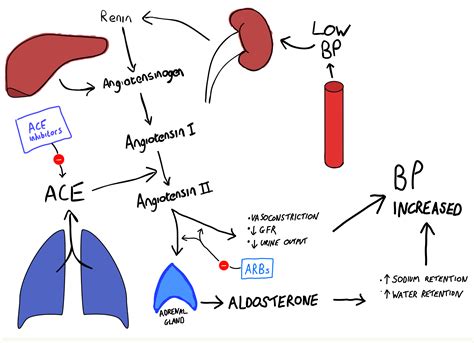ACE Inhibitors - Medications for Blood Pressure and Heart Health | UK Encyclopedia
ACE Inhibitors FAQ
What are ACE inhibitors used for?
ACE inhibitors are commonly used to treat heart failure and high blood pressure and are often prescribed to people following a heart attack. Doireann Maddock puts some common questions to Dr Terry McCormack. What are ACE inhibitors and how do they work?
What are ACE inhibitors & angiotensin II receptor blockers?
Next review due November 2024. Angiotensin-converting enzyme (ACE) inhibitors and angiotensin II receptor blockers (ARBs) are medicines that widen your blood vessels and so, lower your blood pressure. They can treat high blood pressure, and heart and kidney problems.
What are angiotensin-converting enzyme (ACE) inhibitors?
Angiotensin-converting enzyme (ACE) inhibitors are medicines that help relax the veins and arteries to lower blood pressure. ACE inhibitors prevent an enzyme in the body from making angiotensin 2, a substance that narrows blood vessels. This narrowing can cause high blood pressure and forces the heart to work harder.
Do ACE inhibitors reduce blood pressure?
In high blood pressure (hypertension), ACE inhibitors should help to reduce the blood pressure. In heart failure, there may be too much circulating fluid in the blood vessels. ACE inhibitors help to reduce this. They appear to have a protective effect on the heart and slow the progression of the heart failure. Who cannot take ACE inhibitors?
How do ACE inhibitors work?
High blood pressure (hypertension) - ACE inhibitors usually work well to lower blood pressure. Heart failure - ACE inhibitors reduce the strain on the heart by decreasing the amount of fluid pumped around the body. They also help the heart by relaxing blood vessels. This reduces the amount of force needed to eject blood from the heart.
ACE Inhibitors References
If you want to know more about ACE Inhibitors, consider exploring links below:
What Is ACE Inhibitors.
- https://www.bhf.org.uk/informationsupport/heart-matters-magazine/medical/drug-cabinet/ace-inhibitors
- https://www.drugs.com/drug-class/angiotensin-converting-enzyme-inhibitors.html
- https://www.nhs.uk/conditions/high-blood-pressure-hypertension/treatment/
- https://www.mayoclinic.org/diseases-conditions/high-blood-pressure/in-depth/ace-inhibitors/art-20047480
- https://www.medicalnewstoday.com/articles/326791
- https://cks.nice.org.uk/topics/hypertension/prescribing-information/angiotensin-converting-enzyme-inhibitors/
- https://en.wikipedia.org/wiki/ACE_inhibitor
- https://patient.info/heart-health/ace-inhibitors
- https://www.ncbi.nlm.nih.gov/books/NBK431051/
- https://www.bupa.co.uk/health-information/heart-blood-circulation/ace-inhibitors
ACE Inhibitors. Information
Explore Related Topics
Mastering Diabetes Management with Group Exercise Classes
Unleash the potential of group exercise programs as a key component in your diabetes management toolkit.
Are Home Blood Pressure Monitoring Kits Worth the Investment for Diabetic Patients?
Evaluate the benefits and drawbacks of investing in home blood pressure monitoring kits for diabetes care.
Pilates and Diabetes: Unlocking the potential of Pilates in diabetes care
Join the conversation about how Pilates can contribute to a healthier lifestyle for those with diabetes!
